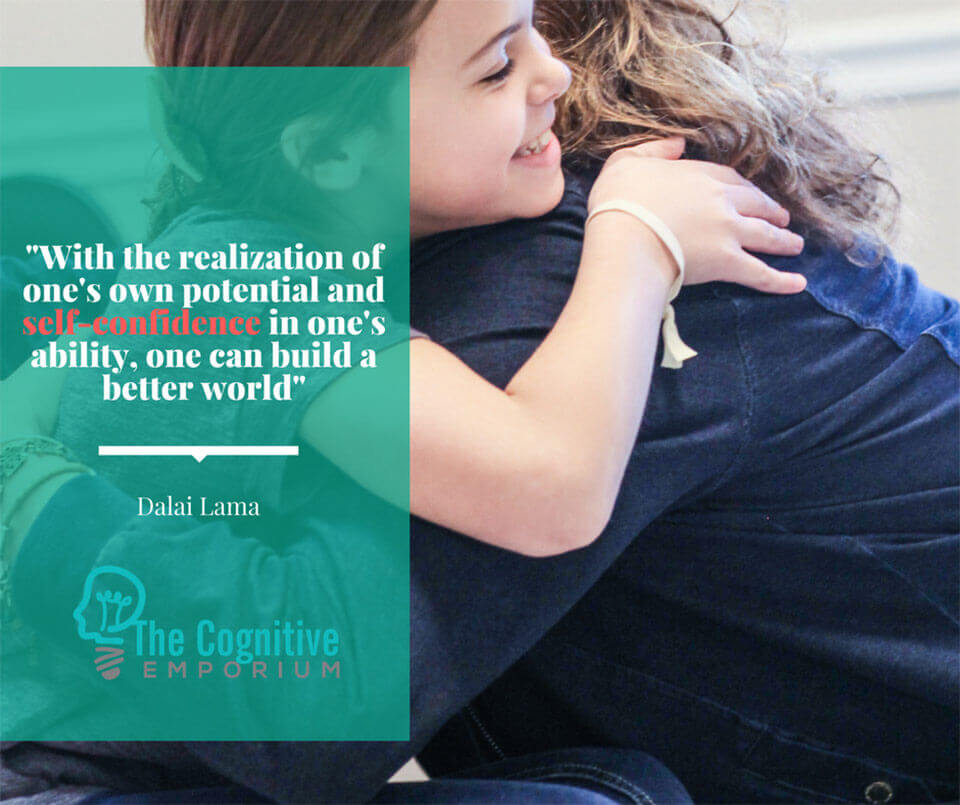Self-Confidence: Developing Your Child's Foundation for Learning
Self-Confidence & Cognition: Building the Connections to Learn

If the only thing your child gained from our cognitive skills training intervention was self-confidence, would it be worth it?
According to the parents whose children have been through our program, the answer is a resounding “Yes.”
The number one feedback I hear from parents after their child completes a program at our center is how thrilled they are with the self-confidence that has been gained.
The good news is that the self-confidence is just an added bonus to our system.
Let’s face it, in a world where parents feel like they have less and less control over harmful influences that impact their children, self-confidence is one of the most important skills your child needs.
Most parents believe that they are responsible for breeding a self-confident child.
While parents do play an active role, a recent study from Dartmouth College shows that people's levels of self-esteem are related to how regions of their brains connect.
Dartmouth researchers found that the connection between the area of the brain dealing with self-knowledge and the area handling reward, predicts self-esteem levels.
They found that people with stronger white matter connections from the part of the brain responsible for self-knowledge on the part of the brain involved in the sensation of reward demonstrated high long-term self-esteem.
One of the highlights of my career is watching children blossom into who they were designed to be.
I especially love watching the girls that come to our clinic with little to no confidence, walk out with their head held high ready to conquer the world.
One of our most significant transformation stories involved a girl, “Tara” (name changed for privacy).
She was in sixth grade at the time of our meeting.
She would not make eye contact and her voice was almost inaudible at times.
I had to stop my evaluation several times due to her severe anxiety and tears that were induced anytime I asked her to read or spell.
I remember questioning whether I should just reschedule the evaluation after she had been seen by a psychologist, but something told me to continue, and I did.
Eventually, she became comfortable enough to control her emotions and her story.
In second grade she had been identified to have a reading disability and was given an individualized education plan (I.E.P.) which allowed her modifications, accommodations, and special intervention to help her learn to read, write, and spell.
My evaluation solidified that Tara was reading at a first-grade level.
However, it became very clear to me why she was so upset: she had normal intelligence.
She had trusted a system to help her, began a new school with the hopes that something would be different, and within a month of being in her new school, it became clear to her that nothing had changed.
She was losing hope that she would ever learn to read.
She did not want to return to school and told me that she never ever wanted to enter a school building again.
I put together a P.A.T.H. treatment plan for diagnostic teaching, which would close the gap between her intelligence and her reading skills, with the goal for Tara to be caught up by the start of her 7th-grade school year.
Tara attended the center four days a week for one hour a day from October through May. In June her treatment plan was reduced to two days a week for one hour until the start of her 7th-grade year.
There was never a day that Tara did not show up eager to learn and demonstrate that she had practiced what she had been taught the session before.
Tara’s last week at the center I remember her clinician being frustrated with her for the first time since the beginning of her therapy.
When I explored the root of the clinician’s frustration I smiled because I knew the time had come for Tara to fly.
The clinician expressed to me a change in Tara’s personality, and she described a typical “sassy” middle school girl who thought she knew it all.
The clinician was confused by my happiness in hearing this change but quickly made the connection once I explained to her what she was seeing. I told her "Tara knows that she is equipped to handle school now and doesn't need us anymore."
This was the Tara that I had been waiting to see. She was ready to jump out of the plane because she knew she had a parachute and can pull the string whenever she needs it.
Her next session, I went in and spoke with Tara and asked her what she wanted to do.
She looked into my eyes and shared her dreams.
I sat smiling as she described how she couldn't wait for the start of 7th-year and her dream of one day becoming an engineer.
I looked into her eyes and told her that I had no doubt that she would achieve anything and everything she set her mind too.
We had done our job.
That little girl that entered my office unable to control her tears and anxiety and was leaving us knowing that she can read, write, and spell well enough to survive middle school and was ready to show everyone what she knew!
The self-confidence, the grit, the determination to overcome her obstacles were the makings of a champion!

